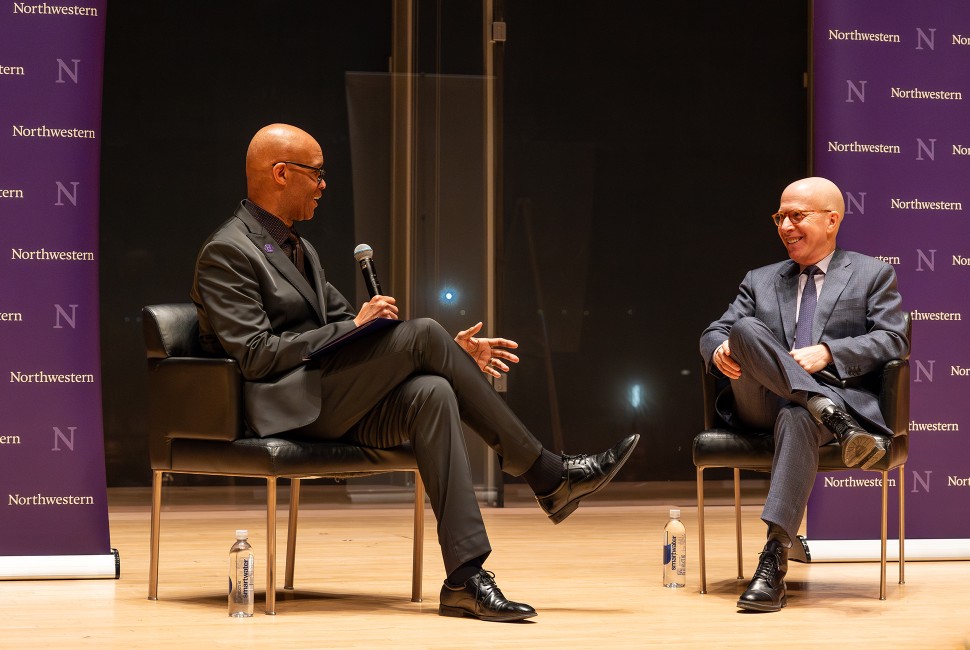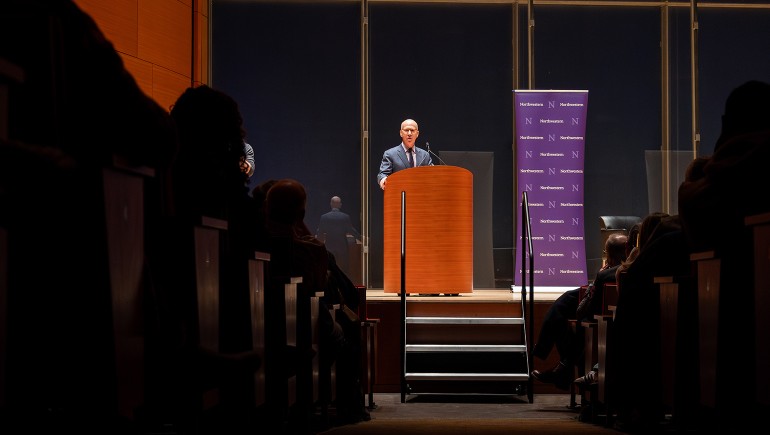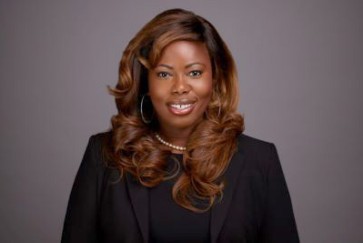Tracing the arc of Martin Luther King Jr.’s life from his first public speech in Montgomery in 1955 to his last in Memphis in 1968, Jonathan Eig discussed the inspiration he draws from King’s life as the MLK Commemoration’s keynote speaker on Jan. 16 on the Evanston campus.
Charles Whitaker, dean of the Medill School of Journalism, Media, Integrated Marketing Communications, introduced Eig ’86, a Northwestern alumnus and author of “King: A Life” (Macmillan Publishers, 2023).
“A Jonathan Eig story is a deep immersion into a world with a compelling narrative that always lifts the work beyond the conventions of traditional reportage to relate something impactful and moving about the human experience,” said Whitaker. “In fact, the New York Times declared that the book we’ll be discussing this evening, ‘King: A Life,’ has supplanted David Garrow’s “Bearing the Cross” as the definitive King biography.”
“One of the things I learned and love most about King is that he had doubts, that he had uncertainty, that he failed, and that he had flaws,” Eig said. “My goal with this book was to provide a more human portrait in hopes that we can connect with King again in a meaningful way that might inspire us again.”
King’s first speech, delivered at the start of the Montgomery bus boycott took place in December 1955. King was 26 years old, a new pastor, new to Montgomery and the father of a newborn. He had no plans to attend the event much less speak, Eig said. But King did speak, believing he was called to speak by God, setting him on a path to become the most celebrated civil rights leader in American history and consequently a perceived threat to the U.S. government and a target of FBI surveillance.
King urged us to never lose hope, to remain vigilant, to stay awake.”
“It just might be that it’s the Black people of America, people who have been treated the worst by this country, who are going to lead it, and who are going to teach it to become a true democracy,” King said. “It just may be that we can show that the words in the Bible can be made to square with the words in our founding documents. And if we are wrong in demanding this equality, then the Constitution is wrong, the Supreme Court is wrong, the Holy Bible is wrong, and God Almighty is wrong.”
Eig spent six years on King’s biography. During that time, he interviewed many who knew King or heard him speak. He also had access to newly declassified documents, including 200 letters between President Lyndon B. Johnson and the FBI’s J. Edgar Hoover, documenting the two men’s obsession with King’s growing influence.
The government stepped up its surveillance of King, because, said Eig, a united Black and white America was a threat to the status quo.
Despite an adversarial government, and divisions within the Civil Rights Movement, King did not back down. His commitment to doing what was right compelled him to speak out about injustices. He also refused to take the advice of trusted advisors to keep his focus on issues in the South and avoid speaking out against the Vietnam War.
In his final speech given in Memphis, King reemphasized the themes of his first speech in Montgomery, his words revealing how heavy the specter of his own death hung over him.
“Longevity is a blessing…but I want to do God’s will. And I have seen the Promised Land. I may not get there with you, but I know that together, we as a people will get to the Promised Land,” he said.
King was assassinated the next day while standing on the balcony of the Lorraine Motel.
“King urged us to never lose hope, to remain vigilant, to stay awake,” Eig said.
“Sometimes for us today, it feels hard. It feels hopeless. It feels like we can't make a difference. But if you look at what King went through, if you look at what he survived…it fills us with the sense that we can go on.”



